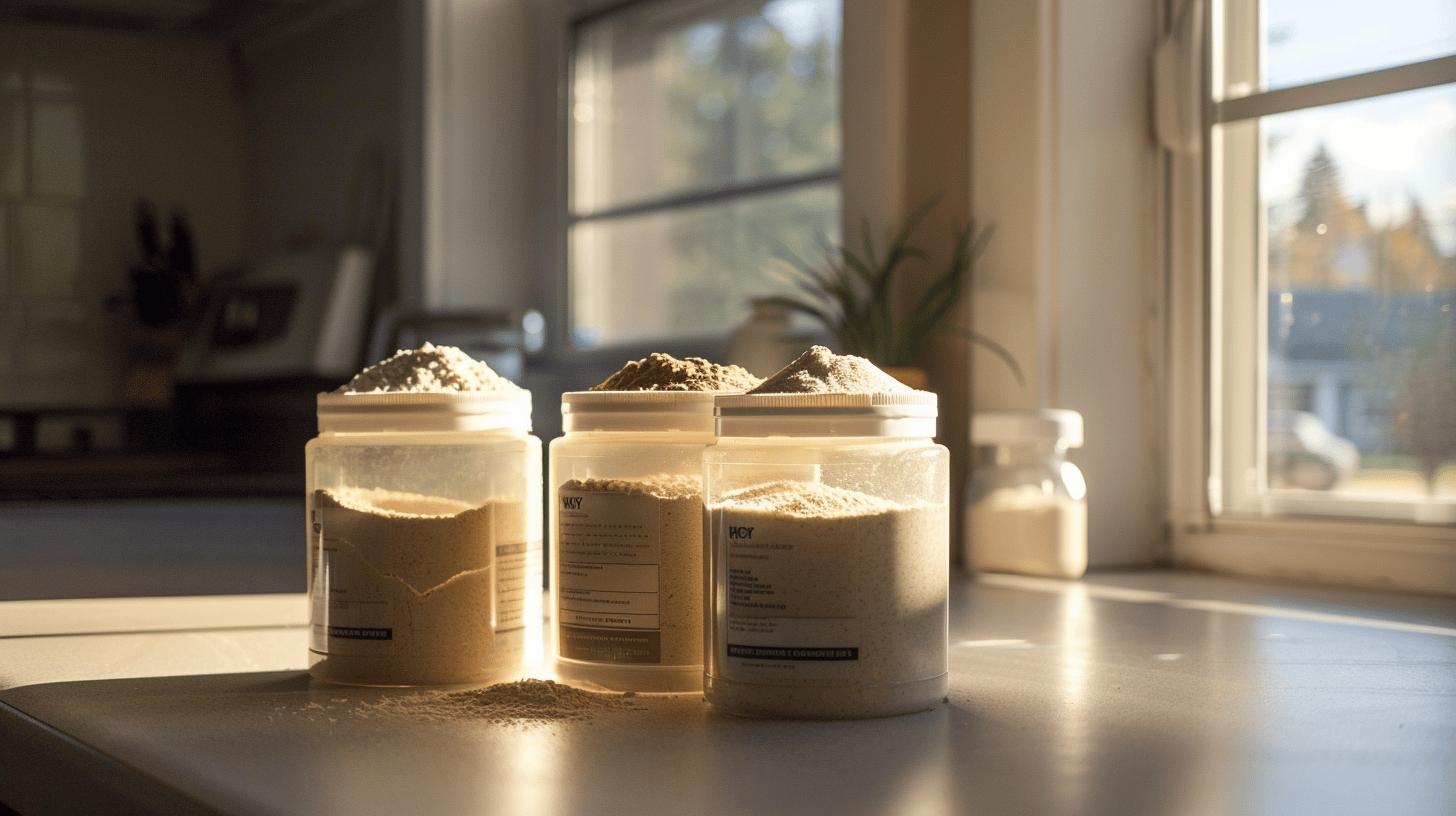Is protein powder necessary for teenagers, or is it just another fad? As teens hit their growth spurts, their nutritional needs spike, making protein supplementation a topic of intense discussion. This article delves into the key benefits and safety considerations of protein powder for teens, critically evaluating its role in their diet. With expert insights and scientific backing, we’ll explore how protein can support growth, development, and overall health while also ensuring safe and effective usage. Read on to unlock the critical factors you need to know about integrating protein powder into a teenager's nutritional regimen.
Importance of Protein Powder for Teens
Protein plays a critical role in the growth, development, and overall health of teenagers. During adolescence, the body undergoes significant changes, and protein supports these processes by aiding in muscle building, tissue repair, and development. It also contributes to immune function and neurotransmitter production, which are essential for cognitive health.
Meeting daily protein requirements is particularly important for teenagers, who need between 0.80 and 1.05 grams of protein per kilogram of body weight. This ensures they get the necessary nutrients for their active and growing bodies. A whole-foods-first approach is recommended, but protein powders can serve as a convenient supplement to meet these needs.
- Supports tissue growth and maintenance
- Aids in muscle building and repair
- Boosts immune function
- Enhances neurotransmitter production
- Contributes to overall development
- Helps maintain a balanced diet
Protein powders can be particularly beneficial for teens with demanding schedules, such as athletes who need to ensure they meet their nutritional requirements. While whole foods should be the primary source of protein, supplements can help fill any gaps, ensuring that teens receive adequate nutrition for optimal growth and development.
Safety of Protein Powder for Teens
Before starting any supplement, it is crucial to consult healthcare professionals. They can provide personalized advice based on a teen's specific health needs and ensure that the chosen protein powder is appropriate for their age and activity level.
Excessive protein intake can pose risks such as kidney stress, imbalanced calcium levels, and hydration issues. Teens should adhere to the recommended dietary allowance to avoid these potential side effects. Specifically, the RDA for protein for children and adolescents in the United States and Canada is between 0.80 and 1.05 grams per kilogram of body weight.
Concerns about protein shakes causing kidney and liver damage or weakening bones in healthy individuals are not supported by scientific evidence. These misconceptions often stem from isolated cases or misinterpreted studies. When consumed within recommended limits, protein shakes are generally safe for teenagers.
The supplement industry is not well-regulated, making it essential to carefully choose safe and high-quality products. Look for protein powders that are third-party tested and free from harmful additives. Opting for well-known brands with transparent ingredient lists can further ensure safety for teen consumption.
Best Protein Powders for Teens

Choosing the right protein powder for teens is crucial to ensure they receive the necessary nutrients without compromising their health. Different types of protein powders cater to various dietary needs and preferences, making it important to select the most appropriate option.
Whey Protein
Whey protein is recommended for teens who can tolerate dairy. It offers high-quality protein and contains all essential amino acids needed for muscle growth and repair. Transparent Labs Grass-Fed Whey Protein Isolate is an excellent choice, providing 28 grams of protein per 32-gram serving. It is virtually lactose-free, making it easier to digest for those with mild lactose intolerance.
Plant-Based Protein
For vegan or allergy-prone teens, plant-based protein powders are ideal. These powders often include a blend of rice and pea proteins to create a complete amino acid profile. Transparent Labs Organic Vegan protein powder is a notable option. It is free from GMOs, soy, added sugars, and artificial ingredients, ensuring a clean source of protein.
Casein Protein
Specialty protein powders like casein are beneficial for specific dietary goals, particularly for those needing a slow-release protein. Transparent Labs 100% Grass-Fed Casein protein is perfect for nighttime use due to its slow digestion rate. This type of protein helps sustain muscle repair and growth throughout the night.
| Protein Powder | Type | Key Benefit |
|—————-|————|——————————————-|
| Transparent Labs Grass-Fed Whey Protein Isolate | Whey | High-quality, virtually lactose-free protein |
| Transparent Labs Organic Vegan Protein Powder | Plant-Based| Complete amino acid profile, free from GMOs |
| Transparent Labs 100% Grass-Fed Casein Protein | Casein | Ideal for nighttime use, slow digestion rate |
Protein Powder for Young Athletes
A balanced diet is crucial for young athletes to support their growth, development, and performance. Whole foods should be the primary source of nutrients, as they provide essential vitamins, minerals, and fibre that supplements alone cannot offer. A diet rich in lean proteins, fruits, vegetables, whole grains, and healthy fats ensures that young athletes get a well-rounded intake of the nutrients necessary for optimal health and athletic performance.
However, due to the demanding schedules of young athletes, incorporating protein shakes can be a practical solution to ensure they receive adequate nutrition. Protein shakes are convenient, quick to prepare, and easy to consume on the go, making them an excellent option for meeting protein needs when time is limited. A good protein powder for teen athletes should provide 20-25 grams of protein per serving, which aligns with their dietary requirements and supports muscle repair and growth.
- Klean Athlete Klean Isolate: Unflavored, ideal for smoothies.
- Transparent Labs Grass-Fed Whey Protein Isolate: High-quality, virtually lactose-free.
- Transparent Labs Organic Vegan Protein Powder: Plant-based, free from GMOs and artificial ingredients.
- Orgain Organic Protein: Plant-based, suitable for vegans and those with dietary restrictions.
While protein shakes can help fill nutritional gaps, they should not replace whole foods. It's essential for young athletes to maintain a balanced diet and use protein powders as a supplement rather than a primary source of protein. By combining a healthy diet with the convenience of protein shakes, young athletes can ensure they meet their nutritional needs and perform at their best.
Potential Side Effects of Protein Powder for Teens
Avoiding excessive protein intake is crucial for teens. Overconsumption of protein can lead to potential health issues such as kidney stress, imbalanced calcium levels, and hydration problems. Teens should adhere to the recommended dietary allowance to avoid these risks.
One of the main concerns associated with high protein intake is the stress it can place on the kidneys. Excess protein in the body requires the kidneys to work harder to excrete waste products. This can lead to dehydration and affect the body’s calcium balance, potentially causing long-term health issues if not managed properly.
Concerns about protein shakes causing kidney and liver damage or weakening bones in healthy individuals are not supported by scientific evidence. These fears are often based on misconceptions and misinterpreted studies. When consumed within recommended limits, protein shakes are generally safe for teenagers.
Consulting healthcare professionals before adding protein supplements to a teen’s diet is essential. Healthcare providers can offer personalized advice, ensuring the chosen protein powder is suitable for the teen's health needs and activity level. This approach helps mitigate potential risks and ensures safe consumption.
Final Words
Recognizing the significance of protein for teens highlights the need to support their growth and development. Ensuring safety when using protein powder by consulting healthcare professionals and choosing quality products protects their health.
Identifying the best protein powders, such as whey, plant-based, and casein, matches various dietary needs and preferences. Protein shakes benefit young athletes’ demanding schedules by providing essential nutrition.
Monitoring potential side effects and avoiding excessive intake ensures safe use. Protein powder for teens, used responsibly, greatly supports their nutritional goals.
FAQ
Is protein powder safe for teens?
Protein powder is generally safe for teens if used correctly. It is essential to consult a healthcare professional to avoid excessive protein intake, which can stress the kidneys and affect hydration.
Can a 14-year-old take whey protein?
Yes, a 14-year-old can take whey protein, but always consult a healthcare professional first. Whey protein provides high-quality protein and essential amino acids, beneficial for growth and development.
Can a 16 year old take protein powder?
A 16-year-old can take protein powder with healthcare guidance. Proper dosage and a balanced diet are key to safe supplementation, aiding in growth and muscle development.
Can a 13-year-old take protein powder?
While a 13-year-old can take protein powder, it should only be used under healthcare supervision. A whole-foods-first approach is generally recommended for teenage nutrition.
Best protein powder for teenage boys?
Whey Protein Isolate from Transparent Labs and plant-based options like rice and pea protein are good choices. These provide essential nutrients without added sugars or artificial ingredients.
Can a 15-year-old take protein powder?
A 15-year-old can take protein powder with appropriate guidelines from a healthcare provider to ensure safe usage and balanced nutrition.
What is the best protein for a 14-year-old?
Whey protein and plant-based proteins such as rice and pea protein are highly recommended. They supply essential amino acids for growth and muscle building.
Protein powder for teenage girl?
Teenage girls can benefit from plant-based protein like Transparent Labs Organic Vegan protein powder. It provides a complete amino acid profile without artificial additives.
Protein for teenager boy?
Teenage boys can benefit from whey protein or plant-based protein powders. These assist in muscle growth and meet daily protein requirements effectively.
At what age can you take protein powder?
Teens can start using protein powder around age 13, but only under the guidance of a healthcare professional to ensure safe and balanced nutrient intake.
What is the best protein powder for teens?
Whey protein, plant-based proteins like rice and pea protein, and casein protein are excellent options. They provide essential nutrients for growth, muscle repair, and sustained energy levels.

